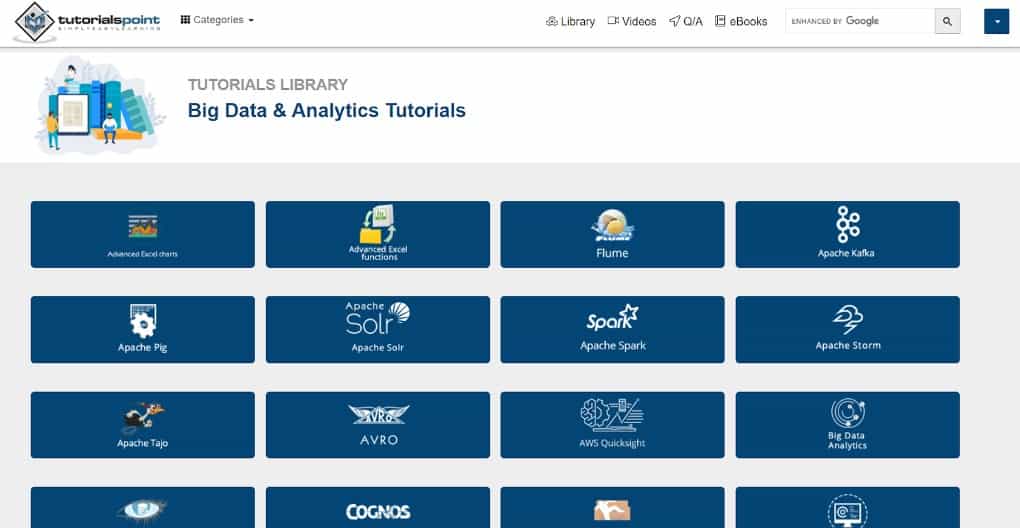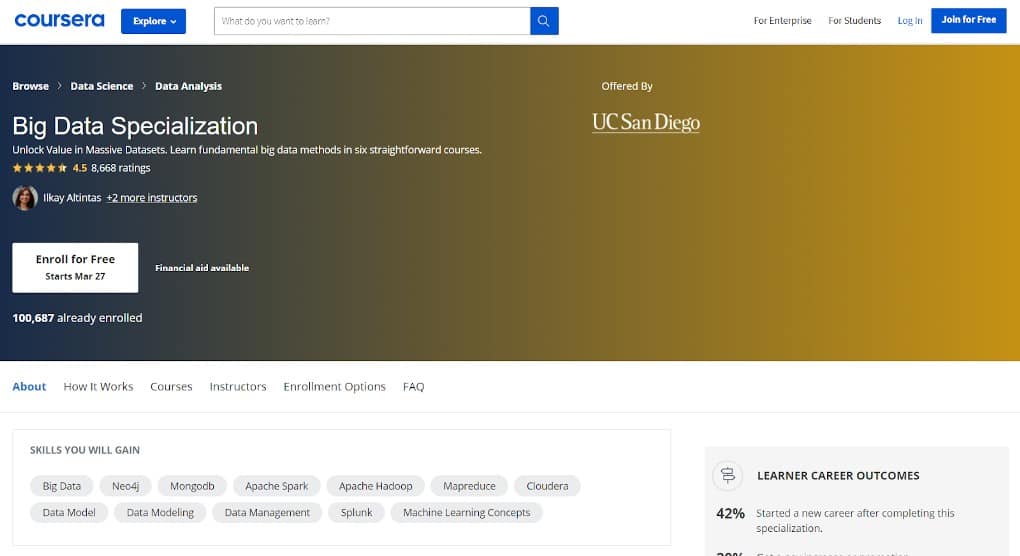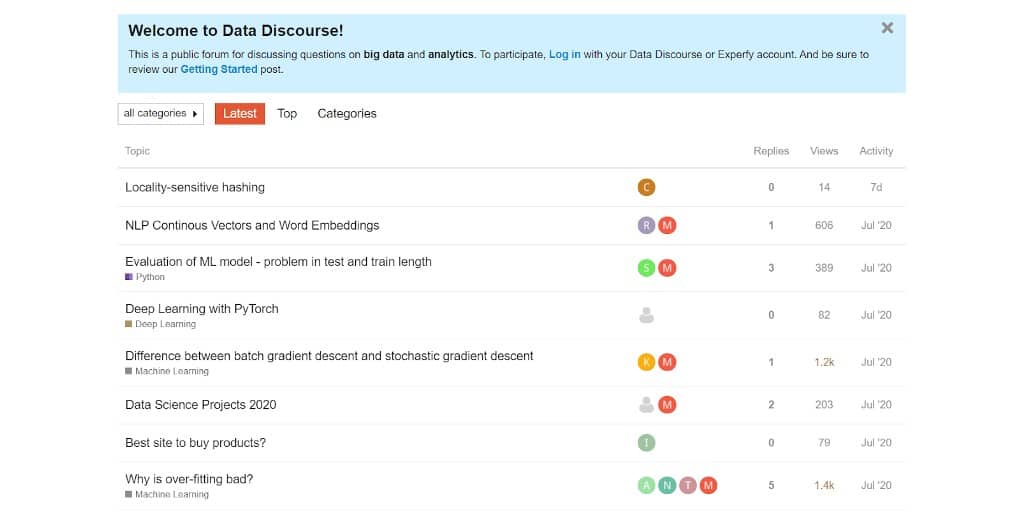
How to Learn Big Data
Organizations and companies collect your data via their products. This may include application data like transactions and user details, or feedback data such as user activity and crash logs. With hundreds of thousands of application instances generating data, it can become difficult to analyze the complete dump. This is where Big Data comes in.
In this guide, we’re going to talk about how to learn Big Data and what resources you can use to master it.
What You Need to Know About Big Data
Big Data refers to data that is excessively huge, high-speed, or complex. This makes it impossible to process this data using traditional processing techniques. Analyzing and drawing conclusions on this data is another tedious task. However, this huge data dump can reap unlimited benefits for businesses if analyzed properly.
Data can directly power a lot of game-changing processes like business analytics, machine learning, and decision-making. And more data relates to better quality output directly. But with increasing data quantity, the overheads on managing this data can become huge, and they can sometimes make this process more costly than beneficial.
Big Data is a concept that aims to solve this problem. Big Data aims to standardize huge data-based operations and make the entire process smooth as well as user-friendly. Some of the most popular characteristics of Big Data are:
- Volume. The name of the technology itself suggests how important volume is to the subject. Whether or not any collection or store of data can be operated upon using Big Data techniques depends on whether it is big enough to qualify as Big Data.
- Variety. Apart from handling large volumes of data, Big Data is also characterized by the homogenous nature of data stored. While traditional data processing techniques can easily handle homogeneous data like that stored in spreadsheets and databases, Big Data aims to normalize the same process for complex data, like data coming from monitoring devices, emails, and photos.
- Velocity. Another crucial characteristic of Big Data is how fast it can handle incoming data. “Fast” refers to the speed at which data is being generated and stored. Big Data is designed to handle data influx that is massive as well as continuous.
- Variability. A data characteristic that can make processing difficult is the variability of data. Variability refers to the inconsistency shown by data throughout a collection or store. This can hamper traditional data analysis processes. Big Data is designed keeping this in mind and does a good job at efficiently handling data variability.
These are only a few of the many things that technology is built around. As you learn more about Big Data, you’ll become aware of more things you can use to help speed up your learning process.
Skills Needed to Learn Big Data
To learn Big Data, have a basic understanding of how data processing works. You do not need to be an expert in data analysis to understand Big Data, but having a preliminary understanding of the concept will help you get started.
Big Data originates from the conventional data stores that are processed upon using standard data analysis and processing techniques. Having prior understanding makes it easy to adapt to the advanced concept of handling huge data dumps easily.
Why You Should Learn Big Data
If you are looking to make a career in data-driven decision-making, Big Data is one of the hottest entrants in the market. The technology provides a competitive advantage over other methods of data analysis, and hence serves as a great tool to detect trends and spot patterns useful to a business.
Since Big Data runs on data and not any business-specific technology, it finds its use in almost all industries that involve storing and handling data. Learning Big Data is an investment of your time and resources into a technology that will not go out of trend anytime soon. If anything, Big Data is predicted to become more and more popular in the coming future.
How Long Does It Take to Learn Big Data?
The answer to this question depends on where you currently stand in data handling and processing. If you have some prior experience, three to four weeks should be sufficient to master the various sub-technologies of Big Data like Hadoop and RainStor. If not, you can expect two to three weeks to cover the topics in all its depth.
Expect to devote four to six hours daily for a period of two to three months to get a good grip on the concepts. Mastering any technology is no easy task, and the same goes for Big Data. Expect to spend about six to seven months perfecting your knowledge to show professional excellence in the subject.
Learning Big Data: A Study Guide
You can easily find plenty of Big Data learning resources online. There is so much information available, you may be wondering where exactly you should start. We have compiled a list of five learning resources to help you learn what you need to know about Big Data.
Big Data & Hadoop Full Course by Edureka

- Resource Type: Video Tutorial
- Price: Free
- Prerequisites: None
Edureka’s Big Data & Hadoop course is a great way to test if Big Data is going to be a good fit for you. The 10-hour long video course is freely available on YouTube and has a good first half-hour on understanding the reason behind Big Data’s existence.
Once you understand the uses of this technology, you will be eased into to the various sub-technologies that make Big Data possible. The course is recommended for those who are absolutely new to the term Big Data, and are looking for a business as well as a technical lesson on it.
Big Data Tutorials

- Resource Type: Written Tutorial
- Price: Free
- Prerequisites: None
The Big Data Tutorials by TutorialsPoint are a highly descriptive collection of tutorials on the technology. Grouped by the underlying sub-technology, each tutorial is a long detour through the said sub-technology. This collection is a massive aggregation of content, and understanding what you are aiming to learn before diving in is extremely important.
If you are an absolute beginner, take another course from this list and then come back to this resource. If you have some experience with Big Data, you will find this tutorial a very handy cheat sheet of all concepts that you will ever encounter in your Big Data career.
‘Big Data Analytics with R and Hadoop’
- Resource Type: Book
- Price: $49.99 (Amazon)
- Prerequisites: None
This book focuses on teaching Big Data to learners from scratch and is a great resource to take if you are completely new to the world of data processing. The use of R and Hadoop is icing on the cake, as you get to learn two additional technologies in the process of learning Big Data.
R and Hadoop are used as the medium of showing practical examples for theoretical concepts explained by this book. Any other distributed computing technology and programming language can be used interchangeably to learn Big Data well.
‘Too Big to Ignore: The Business Case for Big Data’
- Resource Type: Book
- Price: $38.74 (Amazon)
- Prerequisites: Understanding of data processing
This book takes a business-first approach to Big Data. The book talks about the high-level trends which have given origin to Big Data. The book also features detailed case studies and precedents from industry experts to provide a view on the different ways big data can benefit organizations in real life.
Big Data Specialization

- Resource Type: Video Course
- Platform: Coursera
- Price: Free
- Prerequisites: None
Big Data Specialization is one of the top specializations offered by Coursera for free. You can easily complete the specialization in less than eight months if you take at least three hours of content per week. Meant for absolute beginners, the specialization is an assured way to break into the world of Big Data.
Communities for People Studying Big Data
Communities are an excellent resource for anyone who wants to learn Big Data. By joining a community, you can quickly find help. You can also learn more about how other people use Big Data, which may inform how you use the tool.
Below is a list of some communities for people learning Big Data that you may want to look at for more details:
Experfy Forums

Experfy has a dedicated discourse on data on their forums. The platform allows users to post any type of query or doubt and start a discussion on it with fellow community members. The discussions are organized well enough to ensure that you can get to
Big Data has a dedicated list of forums for users to ask and answer questions.
The platform also contains a list of tools, connectors, and other resources. This serves as a great reference point for folks who are new to the technology and are looking for a targeted platform for resolving their queries, either by real user interaction or documentation of any kind.
Big Data Community on AnalyticsVidhya

This community is moderated by the folks at AnalyticsVidhya. It is a forum where people of all experience levels can discuss their queries and seek answers to their questions.
Although it is not focused entirely on Big Data, you can still post your Big Data queries on this forum and get responses from data science and Big Data professionals from around the world.
How Hard is It to Learn Big Data?
Big Data is not among the easiest technologies to learn. This is due to the vast nature of Big Data technologies. Each constituent of a Big Data system is an advanced topic in itself. You need to learn a distributed data processing technology, a database management system, and a programming language to build intelligent backends. Each of these topics may pose challenges in the learning process.
However, these may also make your work easy. Say if you have worked with NoSQL databases as well as Java language in the past, you can couple it with Spark or Hadoop and you are good to go! The learning curve depends entirely on how well you know these individual technologies. For most people, Big Data skills are not too difficult to pick up.
Will Learning Big Data Help Me Find a Job?
Big Data is a highly sought-after database skill in the technology industry. Employers hiring for software development & database administration positions often list Big Data as an essential skill or an important qualification. To help you understand the value of learning Big Data for your career, we have compiled a few job and salary statistics.
- Salaries. PayScale reports that jobs that involve Big Data pay, on average, $111,734 per year. Positions that use this skill include data scientist, data engineer, and machine learning engineer.
- Industry Growth. According to the U.S. Bureau of Labor Statistics, information research scientists’ positions will grow at a rate of 14% until 2028. While not all of these positions will use Big Data, a considerable number of these professionals are likely to use data processing techniques similar to Big Data.
Conclusion: Should You Learn Big Data?
Big Data is a data processing technology that makes it easy to handle large volumes of data at scale. Using Big Data, data engineers can process a high influx of data rapidly.
Big Data is useful no matter what path in data science you aim to pursue. It helps you to shift focus from the issue of large volumes of data to the actual processing of the data with its superior simple and easy to learn technologies.
With high average salaries, strong career growth projections, and a comparatively easy learning curve, Big Data holds the potential to add a lot of value to your career.


